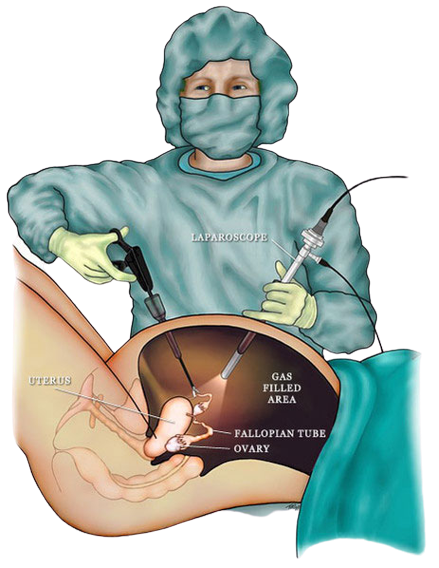Minimai Access Surgery
Understanding Laparoscopic Surgery
laparoscopic surgery, a minimally invasive procedure performed using a slender surgical instrument called a laparoscope. This technique allows for a detailed examination and treatment of reproductive organs without the need for large incisions. Exploring the role of diagnostic laparoscopy in identifying and evaluating conditions such as endometriosis, pelvic adhesions, ovarian cysts, and tubal blockages. It provides valuable insights into the causes of fertility issues and guides further treatment decisions. Highlighting the range of surgical interventions that can be performed using laparoscopy, including removing adhesions, treating endometriosis, repairing damaged fallopian tubes, and addressing certain uterine abnormalities.

Benefits of Laparoscopic and Hysteroscopic Surgeries
Minimally Invasive
These surgeries involve small incisions and result in less trauma to the body compared to traditional open surgeries. This leads to reduced pain, minimal scarring, and faster recovery.
Enhanced Fertility Potential
Laparoscopic and hysteroscopic surgeries can address underlying issues that may be hindering conception or pregnancy. By removing anatomical abnormalities, such as fibroids, polyps, adhesions, or uterine septum, these procedures can improve the chances of successful pregnancy.
Accurate Diagnosis
These surgeries provide a direct visual examination of the reproductive organs, allowing for accurate diagnosis of conditions such as endometriosis, ovarian cysts, tubal blockages, uterine abnormalities, and adhesions. This precise diagnosis helps guide appropriate treatment plans.
Tailored Treatment
Laparoscopic and hysteroscopic surgeries enable personalized treatment plans based on individual needs. The procedures can be customized to address specific fertility-related issues, increasing the likelihood of a successful outcome.
Shorter Hospital Stays
Since these surgeries are minimally invasive, they typically require shorter hospital stays, allowing patients to return to their normal activities sooner.
Success Rates and Considerations
Gynescope's commitment to laparoscopic and hysteroscopic surgeries reflects their dedication to offering state-of-the-art treatments and improving the chances of successful conception. By leveraging these advanced techniques, Gynescope aims to help individuals and couples overcome fertility obstacles and achieve their dream of building a family.
Who Should Consider Laparoscopic and Hysteroscopic Surgeries

Individuals or Couples with Fertility Issues
Those experiencing difficulty in conceiving or maintaining a pregnancy may benefit from these surgeries. Conditions such as endometriosis, fibroids, polyps, adhesions, uterine septum, or tubal blockages can be evaluated and treated.

Individuals with Unexplained Infertility
In cases where the cause of infertility is not clear, laparoscopic and hysteroscopic surgeries can help identify any underlying issues that may be affecting fertility.

Patients with Recurrent Miscarriages
Women who have experienced multiple miscarriages may undergo these surgeries to identify and treat any uterine abnormalities or other factors that contribute to pregnancy loss.

Individuals with Painful Menstrual Periods
Laparoscopic surgery can be beneficial for individuals with conditions such as endometriosis, which often causes severe pelvic pain during menstrual cycles.
Understanding hysteroscopy Surgery

:
Hysteroscopic surgery, a minimally invasive procedure that involves inserting a thin, flexible instrument called a hysteroscope into the uterus through the vagina. This technique allows for visualization and treatment of conditions affecting the uterine cavity.

:
Exploring the role of diagnostic hysteroscopy in assessing and diagnosing conditions such as uterine polyps, fibroids, uterine septum, and adhesions. It helps determine the impact of these conditions on fertility and guides appropriate treatment options. .
GYNESCOPE OFFERINGS
Diagnostic Evaluations: Gynescope conducts thorough diagnostic evaluations using laparoscopic and hysteroscopic techniques. These procedures allow for a direct visual examination of the reproductive organs, helping to identify conditions such as endometriosis, fibroids, polyps, adhesions, uterine septum, or tubal blockages that may affect fertility.
Surgical Interventions: Gynescope performs minimally invasive surgeries, including laparoscopic and hysteroscopic procedures, to treat various fertility-related conditions. Laparoscopic surgery allows for the removal of adhesions, treatment of endometriosis, repair of damaged fallopian tubes, and addressing other anatomical abnormalities. Hysteroscopic surgery enables the removal of polyps, fibroids, and uterine septum, as well as the treatment of adhesions within the uterine cavity.
Enhanced Fertility Potential: By addressing underlying issues through laparoscopic and hysteroscopic surgeries, Gynescope aims to enhance fertility potential. These procedures can improve the chances of successful conception and pregnancy by creating a healthier reproductive environment and optimizing the conditions for embryo implantation.
Personalized Treatment Plans: Gynescope believes in personalized care and tailors treatment plans to the unique needs of each patient. They work closely with individuals and couples to develop customized approaches that consider their specific fertility challenges and goals. Laparoscopic and hysteroscopic surgeries are integral components of these personalized treatment plans.
Minimally Invasive Techniques: Gynescope's expertise lies in performing minimally invasive surgeries, which offer several advantages over traditional open surgeries. These include smaller incisions, reduced post-operative pain, shorter hospital stays, faster recovery times, and minimal scarring. By utilizing laparoscopic and hysteroscopic techniques, Gynescope strives to provide patients with a more comfortable and efficient surgical experience.
Collaborative Approach: Gynescope collaborates with a multidisciplinary team of fertility specialists, including reproductive endocrinologists, nurses, anesthesiologists, and embryologists. This collaborative approach ensures that patients receive comprehensive care throughout their fertility journey, from initial consultations to post-surgical follow-ups.
GYNESCOPE
Contact Us
Call: +234 816 659 3030
Email: gynescope@yahoo.com
Address: G.U Ake Rd 22/23
Newsletter
© 2023 Gynescope All Rights Reserved

